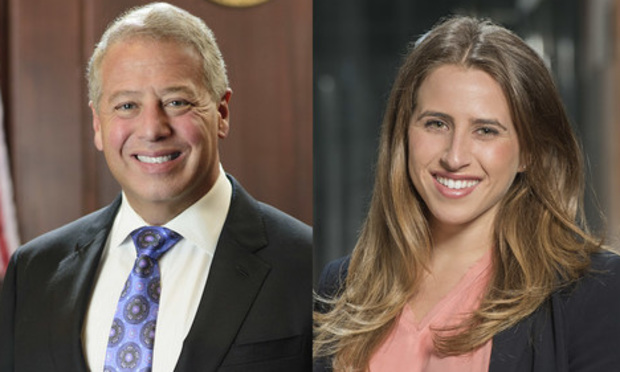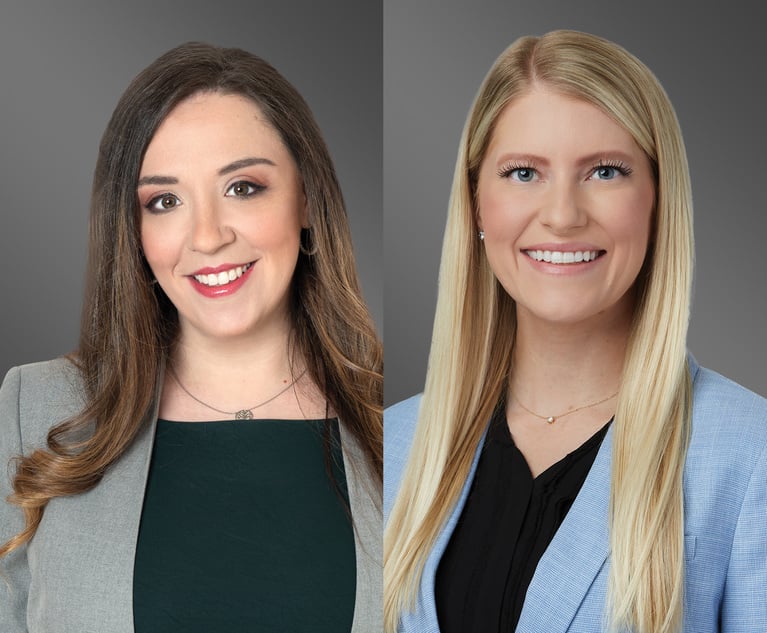Timing Is Everything When Suing a Dead Person
The death of a defendant before a lawsuit is filed or during the pendency of a lawsuit creates very complex issues and is procedurally taxing for any plaintiff lawyer.
March 05, 2019 at 06:50 PM
6 minute read
 Brian Kabateck, left, and Stephanie Charlin, right.
Brian Kabateck, left, and Stephanie Charlin, right.
The death of a defendant before a lawsuit is filed or during the pendency of a lawsuit creates very complex issues and is procedurally taxing for any plaintiff lawyer. In fact, the risk of a plaintiff's claim being barred is substantial given the strict rules that must be followed pursuant to both the Code of Civil Procedure and the Probate Code.
The first thing a Plaintiff should do when he or she finds out a defendant is dead is determine whether he or she is seeking damages within the decedent's insurance policy limits. Probate Code sections 550 through 554 governs claims against a decedent within insurance policy limits whereas California Code of Civil Procedure §§336.2, 337.40 through 377.42, and Probate Code §9390 governs claims for damages in excess of a decedent's insurance policy.
If a Plaintiff is limiting his or her cause of action to the insurance policy limits, then a complaint may be filed within one year after the expiration of the applicable limitations period so long as the defendant/decedent died within the applicable limitation period. Prob. Code. §550, 551. For example, if John Doe gets hit by a vehicle on Jan. 1, 2010 and the driver dies in September 2011, John Doe has until Jan. 1, 2013 (3 years) to file a tort action against the decedent to recover damages within the decedent's insurance policy limits. Probate Code 550 et seq. intends to protect plaintiffs who are seeking damages that are covered by the decedent's insurance policy and the plaintiff may not know at the time he or she files an action that the defendant was deceased, thus providing them with a one year “grace period” to file a lawsuit under this statutory scheme. This limitation is further set out in Probate Code §554 which states that “either the damages sought in an action under this chapter shall be within the limits and coverage of the insurance, or recovery of damages outside the limits or coverage of the insurance shall be waived. A judgement in favor of the Plaintiff in this action is enforceable only from the insurance coverage and not against property in the estate.” Prob. Code. §554.
However, if the Plaintiff wants to sue the decedent for damages beyond the decedent's insurance policy limits, then the Plaintiff has only one year from the time of the decedent's death to bring an action or the claims are forever barred. Code Civ. Proc. §336.2. This harsh rule does not consider the limitations period of the underlying action or whether the Plaintiff knew the defendant was dead. Using the example above, Plaintiff John Doe would only have until September 2012 (one year from the defendant's death) to bring his tort claim against the driver or his action would be barred. This is true even though the applicable tort limitations period (two years) would otherwise allow him to bring an action until January 2012. The purpose of the one-year limitations period applicable to claims of creditors against a decedent's estate is to protect decedents' estates from creditors' stale claims. See Stoltenberg v. Newman (App. 2 Dist. 2009) 179 Cal.App.4th 287, rehearing denied, review denied, on subsequent appeal 215 Cal.App.4th 1225. Thus, it rightfully promotes finality in legal affairs associated with death.
It must also be noted that when you sue a decedent to recover damages in excess of the policy limit, the Plaintiff must comply with specific creditor claim procedures prior to filing the lawsuit. See Code Civ. Proc. §377.40 et seq; Prob. Code §9351, 552, 9390(c). Plaintiffs must file a creditor's claim against the decedent's estate in probate court within either four months from the date that the letters of administration are first issued to a personal representative or 60 days after notice of administration is given to the creditor—whichever is later. Prob. Code sections 9100 et seq., The personal representative of the decedent's estate has 30 days to accept to pay or reject the claim. Prob. Code §9256. If 30 days goes by without any response from the estate's personal representative, the creditor's claim is deemed rejected. Ibid. Once the claim is rejected, the Plaintiff must file the lawsuit within three months of the rejection or the suit will be time barred. Prob. Code §§9352, 9353, 9371. It is important to note that once the creditor's claim is filed, the one-year time bar pursuant to Code of Civil Procedure §336.2 is tolled. Nevertheless, the creditor's claim must be filed within one year of the decedent's death or the claim is barred entirely.
If probate for the decedent's estate has not been opened, the Plaintiff may open probate on his or her own behalf as a creditor with the intent to reject his or her own creditor's claim. See Prob. Code §800 (allowing any interested person to commence probate proceedings for administration); Prob. Code §48 (including a creditor in the definition of “interested person”). From there, there are additional procedural hurdles the plaintiff must go through to be able to attach or marshal the decedent's assets to satisfy the creditor's claim, including filing a petition to be appointed special or general administrator of the decedent's estate and filing several unfamiliar judicial council forms.
Although this procedure may seem daunting, especially for plaintiff attorneys unfamiliar with probate, if done correctly a plaintiff will still get his day in court. In sum, it is paramount that Plaintiffs' counsel be familiar with these rules or he or she risks forfeiting his client's otherwise valid cause of action.
Brian S. Kabateck is a consumer rights attorney and founder of Kabateck LLP in Los Angeles. He represents plaintiffs in personal injury lawsuits, mass torts litigation, class actions, insurance bad faith lawsuits, insurance litigation and commercial contingency litigation.
Stephanie Charlin is an associate with Kabateck LLP with an expertise in consumer class actions, personal injury, product liability actions, wrongful death and insurance bad faith claims.
This content has been archived. It is available through our partners, LexisNexis® and Bloomberg Law.
To view this content, please continue to their sites.
Not a Lexis Subscriber?
Subscribe Now
Not a Bloomberg Law Subscriber?
Subscribe Now
NOT FOR REPRINT
© 2025 ALM Global, LLC, All Rights Reserved. Request academic re-use from www.copyright.com. All other uses, submit a request to [email protected]. For more information visit Asset & Logo Licensing.
You Might Like
View All
What Will It Mean in California if New Federal Anti-SLAPP Legislation Passes?
9 minute read
For Growing Law Firms, Customizable Financing Can Unlock Opportunities
6 minute read
The Rise of Female Breadwinners: Challenging Traditional Divorce Dynamics
4 minute read
An Overview of Proposed Changes to the Federal Rules of Procedure Relating to the Expansion of Remote Trial Testimony
15 minute readTrending Stories
- 1We the People?
- 2New York-Based Skadden Team Joins White & Case Group in Mexico City for Citigroup Demerger
- 3No Two Wildfires Alike: Lawyers Take Different Legal Strategies in California
- 4Poop-Themed Dog Toy OK as Parody, but Still Tarnished Jack Daniel’s Brand, Court Says
- 5Meet the New President of NY's Association of Trial Court Jurists
Who Got The Work
J. Brugh Lower of Gibbons has entered an appearance for industrial equipment supplier Devco Corporation in a pending trademark infringement lawsuit. The suit, accusing the defendant of selling knock-off Graco products, was filed Dec. 18 in New Jersey District Court by Rivkin Radler on behalf of Graco Inc. and Graco Minnesota. The case, assigned to U.S. District Judge Zahid N. Quraishi, is 3:24-cv-11294, Graco Inc. et al v. Devco Corporation.
Who Got The Work
Rebecca Maller-Stein and Kent A. Yalowitz of Arnold & Porter Kaye Scholer have entered their appearances for Hanaco Venture Capital and its executives, Lior Prosor and David Frankel, in a pending securities lawsuit. The action, filed on Dec. 24 in New York Southern District Court by Zell, Aron & Co. on behalf of Goldeneye Advisors, accuses the defendants of negligently and fraudulently managing the plaintiff's $1 million investment. The case, assigned to U.S. District Judge Vernon S. Broderick, is 1:24-cv-09918, Goldeneye Advisors, LLC v. Hanaco Venture Capital, Ltd. et al.
Who Got The Work
Attorneys from A&O Shearman has stepped in as defense counsel for Toronto-Dominion Bank and other defendants in a pending securities class action. The suit, filed Dec. 11 in New York Southern District Court by Bleichmar Fonti & Auld, accuses the defendants of concealing the bank's 'pervasive' deficiencies in regards to its compliance with the Bank Secrecy Act and the quality of its anti-money laundering controls. The case, assigned to U.S. District Judge Arun Subramanian, is 1:24-cv-09445, Gonzalez v. The Toronto-Dominion Bank et al.
Who Got The Work
Crown Castle International, a Pennsylvania company providing shared communications infrastructure, has turned to Luke D. Wolf of Gordon Rees Scully Mansukhani to fend off a pending breach-of-contract lawsuit. The court action, filed Nov. 25 in Michigan Eastern District Court by Hooper Hathaway PC on behalf of The Town Residences LLC, accuses Crown Castle of failing to transfer approximately $30,000 in utility payments from T-Mobile in breach of a roof-top lease and assignment agreement. The case, assigned to U.S. District Judge Susan K. Declercq, is 2:24-cv-13131, The Town Residences LLC v. T-Mobile US, Inc. et al.
Who Got The Work
Wilfred P. Coronato and Daniel M. Schwartz of McCarter & English have stepped in as defense counsel to Electrolux Home Products Inc. in a pending product liability lawsuit. The court action, filed Nov. 26 in New York Eastern District Court by Poulos Lopiccolo PC and Nagel Rice LLP on behalf of David Stern, alleges that the defendant's refrigerators’ drawers and shelving repeatedly break and fall apart within months after purchase. The case, assigned to U.S. District Judge Joan M. Azrack, is 2:24-cv-08204, Stern v. Electrolux Home Products, Inc.
Featured Firms
Law Offices of Gary Martin Hays & Associates, P.C.
(470) 294-1674
Law Offices of Mark E. Salomone
(857) 444-6468
Smith & Hassler
(713) 739-1250






